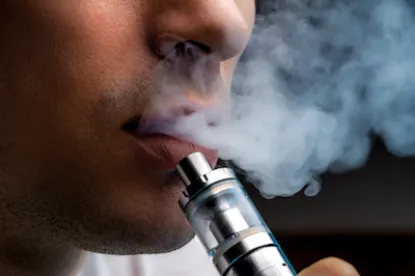The US Court of Appeals for the Ninth Circuit affirmed a preliminary injunction barring the defendant from selling counterfeit e-cigarette and vaping products bearing the plaintiff’s logo because the plaintiff’s psychoactive products were legal and could support a valid trademark. AK Futures LLC v. Boyd St. Distro, LLC, Case No. 21-56133 (9th Cir. May 19, 2022) (Kleinfeld, Fisher, Bennett, JJ.)
AK Futures manufactures e-cigarettes and vaping products, including delta-8 THC goods marketed under its “Cake” brand. Delta-8 THC is a psychoactive compound found in the Cannabis sativa plant, which encompasses both hemp and marijuana. The compound is similar in effect to delta-9 THC, the primary psychoactive agent in marijuana, but delta-8 THC is typically manufactured from hemp-derived cannabidiol (CBD). The cultivation and possession of hemp was legalized by the Farm Act in 2018.
AK Futures sued Boyd Street Distro, a Los Angeles purveyor of smoke products, for trademark and copyright infringement. Boyd Street sold virtually identical counterfeit Cake-branded e-cigarettes and vaping products containing delta-8 THC. At the time of suit, AK Futures had a registered copyright protecting its Cake logo—a stylized “C” overlaying a two-tier cake—and pending trademark applications for six marks incorporating the word “Cake” or the Cake logo for use in connection with e-cigarette products. The district court granted AK Futures’ motion for preliminary injunction. Boyd Street appealed.
On appeal, Boyd Street conceded the copyright claim, but argued that AK Futures could not own a valid trademark in connection with its e-cigarettes and vaping products because the sale of delta-8 THC was prohibited under federal law. In response, AK Futures argued that the 2018 Farm Act legalized delta-8 THC and products containing the compound.
The Ninth Circuit agreed that AK Futures’ use of the marks in commerce was lawful and could give rise to trademark priority. The Court found that the “plain and unambiguous” text of the Farm Act indicated that delta-8 THC products were lawful. The Farm Act removed “hemp” and “tetrahydrocannabinols in hemp” from Schedule I in the Controlled Substances Act, where “hemp” is defined as “the plant Cannabis sativa L. and any part of that plant, including . . . all derivatives, extracts, [and] cannabinoids . . . with a delta-9 concentration of not more than .3 percent.” The Court noted that the delta-9 THC concentration level was the only statutory metric for distinguishing marijuana from hemp, and that the terms “derivative, extract, or cannabinoid” were substantially broad. The Court thus concluded that “hemp” encompasses delta-8 THC products that contain no more than 0.3% delta-9 THC.
Boyd Street argued that the US Drug Enforcement Agency had interpreted the Farm Act as not applicable to delta-8 THC because it is “synthetically derived” and argued that US Congress never intended the Farm Act to legalize psychoactive substances. The Ninth Circuit perfunctorily dismissed these arguments based on the clear and unambiguous statutory language. Since the Cake-branded products allegedly contained less than 0.3% delta-9 THC, the Court held that AK Futures was likely to succeed in demonstrating that its products were not illegal and could support a valid trademark.
The Ninth Circuit found that the irreparable harm and public interest factors also supported the imposition of a preliminary injunction. While Boyd Street stated that it did not plan to sell any Cake-branded products in the future, the store lacked sufficient safeguards against selling counterfeit products. Boyd Street conducted its business in cash, did not keep sales documentation and relied on invoices alone to assess product authenticity. The Court also noted that AK Futures screens its products for “heavy metals, pesticides, and other contaminates,” but it cannot test counterfeits. Because trademark law “allows consumers to distinguish between brands that take consumer health seriously . . . and those that do not,” the Court found that the public interest favored an injunction. The Court thus affirmed the preliminary injunction in AK Futures’ favor and remanded for further proceedings.



 />i
/>i
